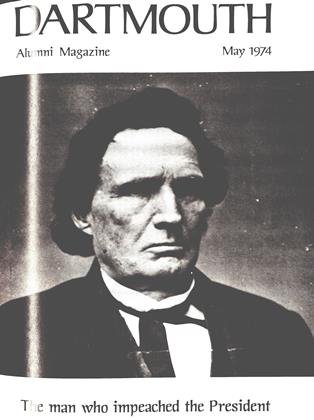CHRISTIAN FAITH IN BLACK AND WHITE: A PRIMER IN THEOLOGY FROM THE BLACK PERSPECTIVE.
May 1974 FRED BERTHOLD JR. '45CHRISTIAN FAITH IN BLACK AND WHITE: A PRIMER IN THEOLOGY FROM THE BLACK PERSPECTIVE. FRED BERTHOLD JR. '45 May 1974
ByWarner R. Traynham '57. Wakefield (Mass.):Parameter Press, 1973. With appendices andbibliography, 121 pp. Hardcover, $7; paperback,$3.
Dartmouth's newly appointed dean of the William Jewett Tucker Foundation has made a far more substantial contribution to black theology than the size of the present volume might seem to promise. His points are made succinctly and clearly, and are not just his points, but the central ones in the biblical faith: creation, election, sin, love and justice, redemption, repentance and reconciliation. At the same time, however, Father Traynham demonstrates that these themes have a very particular meaning and power when viewed from the black perspective. We are reminded that all thinking is done from a particular perspective, that "what has passed for plain theology has always been white theology." We are properly reminded of the "scandal of particularity" in the Bible itself. God revealed himself in a very special way to a particular people. The fact that they were slaves in an alien land with their yearnings and struggles directed towards freedom determines the fundamental biblical understanding of redemption. Mr. Traynham claims that, because of their experience, blacks are in a better position to understand the meaning of that particular revelation. The book as a whole justifies that claim.
Due to the brevity of the book, proper qualifications are sometimes ignored. Among other things Chapter 5, "Love and Justice," gives an interpretation of Jesus's ethical teachings, - e.g. "turn the other cheek." With a growing recognition among New Testament scholars of the radically apocalyptic nature of Jesus's outlook, it is not possible, I think, to draw direct support from his teachings for the realistic and pragmatic power ethic which Father Traynham so persuasively advocates. "... powerlessness corrupts no less than power." This point is extremely well made, but its relation to Jesus's teaching is neither so direct nor so obvious as the author implies.
Fresh light is shed upon major theological problems. But this is not done in an abstruse or theoretical way. The points are clarified and sharpened with reference to very concrete social, economic, and political problems. One of the major contentions, amply illustrated and defended, is that sin and redemption are corporate and not just individual. Those who say that "Christian love" is the answer are reminded that love itself requires that men "find means to limit the power of the oppressor.... If they do not, then they do not will the oppressor's fulfillment, because they cooperate in his distortion." "In the context of oppression, Christian love cannot be anything else but revolutionary."
The book is called a "primer," which is fitting in view of its simplicity and clarity. The great achievement of the author is that he combines that simplicity with a profound understanding and thus contributes significantly to the development of a more adequate theology for our time.
The Kelsey Professor of Religion, DartmouthCollege, Mr. Berthold has taught courses inModern Religious and Anti-Religious Thinkers,Luther and the Protestant Reformation, Liberaland Radical Theology, and The Problem ofEvil.
 View Full Issue
View Full Issue
















